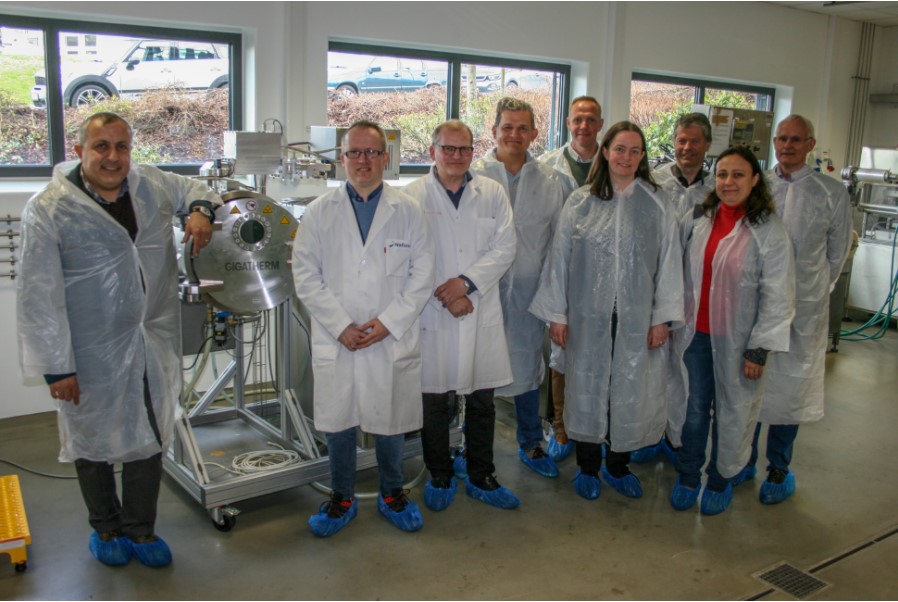Innovative Processing of Vegetables and Potato

Introduction / Background
We want to make better use of peels, stalks and other waste from the potato and vegetable industries, by using technologies that reduce food waste, have a low environmental impact and provide healthier and more tasteful foods.
The global volume of vegetable food waste, not including agricultural waste, is estimated to 400 million tons/year. Valorization of unused biomass during processing thus enhances food production sustainability and contributes to a lower ecological impact. Waste will be reduced in the food supply chain by pre-treatment for stabilization and efficient extraction with minimal use of solvents, for recycling into the food chain. This will be investigated using the novel technologies PEF and SFE in combination with mild technologies like Low-oxygen milling and Dry-On-Water technology.
The project will increase consumers to access to safe, healthy and convenient food through novel energy efficient processing techniques and improve utilization of raw material, by-products and waste, for which valorization strategies will be developed.
Aim
InProVe aims at developing sustainable food production systems addressing novel, innovative technologies for processing of potatoes and vegetables (e.g. carrot, black salsify). The novel processing technologies, including 3 types of Microwave Heating and Pulsed Electric Field (PEF) will be utilized to demonstrate the potential to combine savings in energy and water consumption and improvement of sensorial and nutritional quality. Pre-treatment using PEF, and Supercritical Fluid Extraction (SFE) will add value to underutilized by-products and waste. Mathematical modelling and innovative process design will be used to optimize the conditions for the innovative processing technologies, with the aim to improve energy and cost efficiency. Modelling will also be used to predict how process design influences the kinetics of nutrient retention, functional properties of treated foods, and how they contribute towards desired properties and quality. Additionally, innovative canning technology introducing modified can geometries will complement process design to further optimize energy efficiency.
Expected results
Progress despite Covid-19 pandemic measures: As a consequence of the various pandemic measures in the partner countries during the spring 2020, several experiments and research exchange have been delayed. However, InProVe scientists have been able to focus on writing, planning and publishing. The project is progressing despite the challenging circumstances, and several digital meetings have taken place.
New technologies represent opportunities to create higher added value out of agrifood by-products in a sustainable way.
Canning: In canning heat transfer rate is mainly influenced by container shape & product type. Since convective heat transfer coefficient is assumed infinite, this leaves container geometry the only option to increase heat transfer rate and decrease process time for further quality improvement. A recent innovation is the use of toroidal cans for a significant heating rate increase for both solid and liquid food products. The advantage of toroid cans for heat treatment of canned food products is clear, but effect is dependent on food matrix. Collected data will be used in future modelling and kinetic studies of relevant macro- en micronutrients, bioactives.
Use of PFE and SC-CO2 for extraction of phytochemicals: PEF & SC-CO2 are useful ‘green’ technologies to extract valuable phytochemicals. PEF was evaluated as pre-treatment before SC-CO2 extraction to recover carotenoids from carrot by-products. Follow-up experiments are planned with other by-products.
Use of HMEC for texturizing plant-derived ingredients: HMEC is an interesting technology to turn plant-based ingredients into ‘meat-like’ products. Protein-rich by-products will be evaluated as raw materials in a high-moisture extrusion cooking process.
Keywords
Innovative Processing, Sustainable Food Production, Vegetables, Resource Efficiency, Nutritional Value

Project consortium
Coordinated by
Dr. Trond Løvdal - Nofima NORWAY
Partners
- BELGIUM: Institute for agriculture, fisheries and food research (ILVO) and Greenyard Prepared (GP);
- SWEDEN: Research Institutes of Sweden;
- NORWAY: HOFF SA and Fjordland AS
- TURKEY: Central Research Institute of Food and Feed Control (CRIFFC) and Ankara University (AU)
- SPAIN: MONDRAGON GOI ESKOLA POLITEKNIKOA JOSE MARIA ARIZMENDIARRIETA S COOP (MGEP)
Runtime project
The InProVe project started on 01/07/2018 and runs until 31/12/2021
Follow the project
More information
- Flyer: New technologies: Less waste, better food
- Project Mid-term seminar presentation
- Project Mid-term seminar poster
- Project poster EFFoST meeting
- Rise poster EFFoST 2019
- Project poster EFFoST Rotterdam
- Project poster
- Presentation: Reduced losses and improved nutritional value in potato processing
Research articles
- All Publications
- EU research collaboration: Success or failure?
- Valorization of Tomato Surplus and Waste Fractions: A Case Study Using Norway, Belgium, Poland, and Turkey as Examples
- A hole in the can may provide better canned food by Lidunn Losaker, Nofima
- Banning Canning is a misunderstanding
- HERMETICALLY SEALED INNOVATIONS
- Many Europeans lack knowledge of proper microwave use
- Less potato waste and better food with new technologie
- Toroidal cans for thermal processing of liquid and solid-liquid mixtures under static and end-over-end rotation (DOI)
Press releases
- Valorization of Tomato Surplus and Waste Fractions: A Case Study Using Norway, Belgium, Poland, and Turkey as Examples
- A hole in the can may provide better canned food by Lidunn Losaker, Nofima
Video